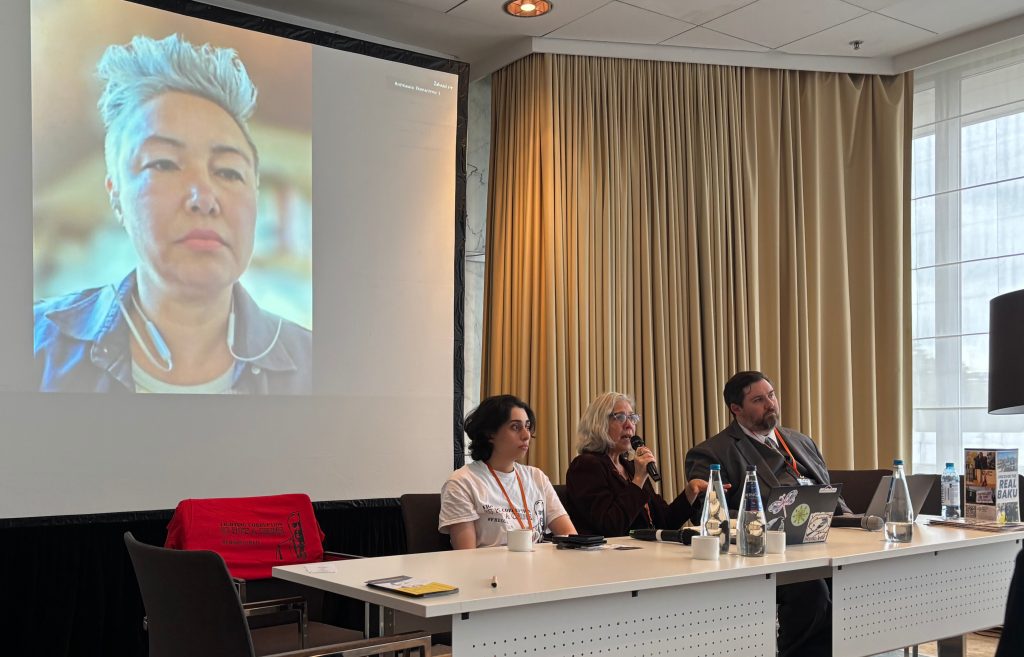
1 November 2024
WARSAW, Poland—On October 4, 2024 at the OSCE Warsaw Human Dimension Conference, Crude Accountability and Freedom Now co-hosted the side event, “Climate Justice, Authoritarianism, and COP29,” discussing human rights and environmental degradation in Azerbaijan, and the unlikelihood of transparent and meaningful climate talks at this year’s COP in Baku.
Speakers included Karl Horberg (Program Director, Freedom Now), Zhala Bayramova (Human Rights Lawyer), and Aliya Wedelich (Media Coordinator, CAN EECCA), with moderation by Kate Watters (Executive Director, Crude Accountability).
This is the third year in a row that the COP will be held in an authoritarian country, and Watters opened the conversation by questioning the conference’s legitimacy and the ability for there to be full civil society participation in such a repressive environment. Watters highlighted the current state of Azerbaijan with 319 political prisoners in detention, its crackdown on civil society, and the country’s dependency on fossil fuels, including “over 80% of the exports in the fossil-fuel sector [coming] from BP’s investments and […] exports comprising over 90% of fossil-fuel exports.” President Ilham Aliyev recently underscored the country’s reliance on fossil fuels, stating publicly that oil and gas are a “gift from God” and the Azerbaijani government has no intention of reducing its fossil fuel footprint..
Horberg also highlighted the latest crackdown on Azerbaijani civil society in the lead-up to COP29 but noted that the Aliyev regime’s attack on civil society is nothing new. During the Eurovision Song Contest in 2012 and the European Games in 2015, the government sought to silence all voices of dissent by jailing journalists, NGO leaders, opposition party members, labor activists, academics, and human rights defenders. Additionally, Horberg mentioned that a month after it was announced in December 2023 that Azerbaijan would host COP29, the government began arresting members of Abzas Media – one of the remaining Azerbaijani independent news outlets. Since then, “it has arrested dozens more individuals, and [there is] a list of political prisoners [that is] nearly double than it was during the 2014 crackdown.”
Following Horberg’s remarks, Bayramova spotlighted the case of their father, Dr. Gubad Ibadoghlu, who is an Azerbaijani economist and human rights defender known for exposing the corruption of the oil and gas industry and the Aliyev regime. Ibadoghlu has been detained in Azerbaijan since July 2023 and is currently under house arrest with no access to medical care and under strict surveillance. Despite the bleak situation, Bayramova was quick to remind the room that they have agency for their father’s release and called on Western leaders to apply more pressure on Azerbaijan:
“It is very important to understand that Azerbaijan is not in a bubble. Azerbaijan is connected to other countries. It’s connected to the USA. It’s connected to Europe. It’s connected to Russia and other countries around it. So if there is enough pressure from the West, people’s lives can be saved.”
Wedelich also stressed the influence on the location of this year’s COP – a post-Soviet country that is geographically and culturally close to Central Asia. Speaking to the room via Zoom, Wedelich noted how Azerbaijan and Central Asian countries face the same challenges, including fossil-fuel production, the rise of nuclear energy, and authoritarian ambitions. She made a point to call attention to the fact that COP29 is not only about Azerbaijan, emphasizing that “it’s a global conference, and it’s a regional conference that highlights not only [Central Asian] challenges, but also [its] potential as a region.” She followed with an appeal to not boycott COP29 and, instead, support civil society in attendance. She described civil society as “one of the few democratic forces left in the region; therefore, international support from civil society in [Central Asian] countries is absolutely essential.”
While each speaker focused on a different aspect of the lead-up to COP29 at the side event, they shared the same vision of a participatory civil society for meaningful climate talks and the unconditional release of all political prisoners held in Azerbaijan. To learn more about COP29, visit our Media Kit, which contains research papers, press briefings, and videos on Azerbaijan’s environmental and human rights abuses.
